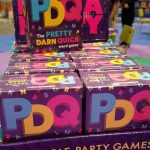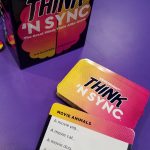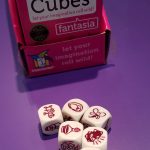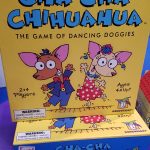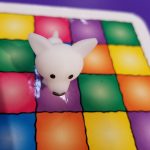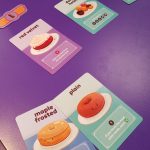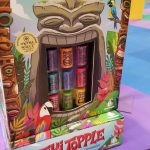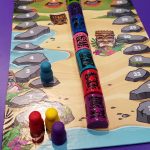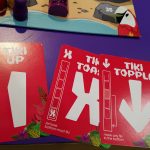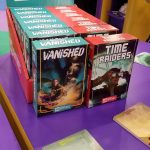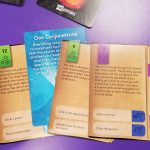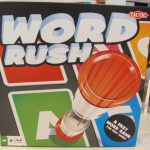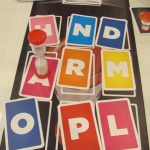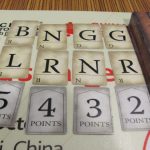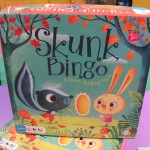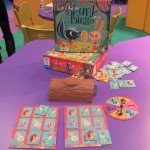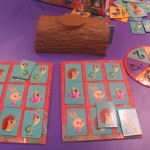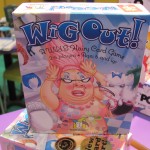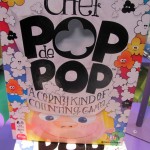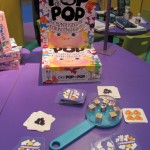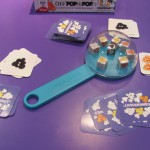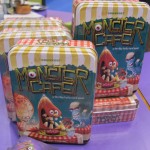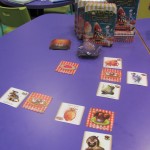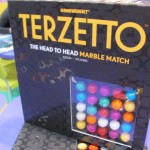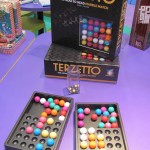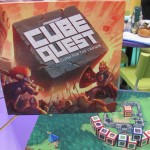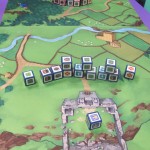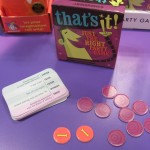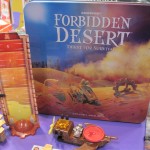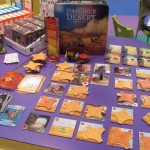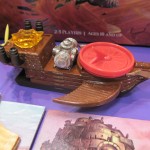 One of of the larger booths I visited at Toy Fair was Gamewright. Several small games were on display as were some games that are about to return to your game store’s shelves.
One of of the larger booths I visited at Toy Fair was Gamewright. Several small games were on display as were some games that are about to return to your game store’s shelves.
In the Port-A-Party line of small games, they had Think ‘n Sync and PDQ, both available in March for $10. PDQ, which we’ve discussed before, has been out of print for five years and returns in a box sized to fit in the Port-A-Party line. In that game, three letter cards are placed in a row and players race to create a word using those letters either left-to-right or right-to-left. Think ‘n Sync is a game that reminded me a bit of Family Feud, except everyone shouts out their answer. Matches gain points.
Rory’s Story Cubes, Fantasia edition, is on its way for a summer release ($8). Fantasia contains three Enchanted dice, three Myth dice, and three Medieval dice.
Cha-Cha Chiahuahua (summer, $16) comes with a bunch of little doggie figures and several disco dance floors for kids 4 and up. Do activities and place your dancing pups on the color-coded dance floor.
Go Nuts for Donuts (summer, $15) is a Sushi Go-like game with bidding instead of drafting. Donut cards are laid out and you select which one to add to your collection; if others are also going for your choice, you all lose out. Each type of donut has different abilities, such as a point reward for having the fewest cards, ability to steal donuts from the discard pile, or a significant number of points for having a large collection of one type.
Imagine (now, $15) is charades with clear cards. Transparent cards with symbols printed on them are layered atop one another to create images others have to guess. A clever way to use see-through cards. Can you tell what’s on the center of the box above?
Tiki Topple (summer, $20) is a reprint of a ten year old game. This new Mensa Select edition has players trying to assemble a totem pole with certain tiki heads nearest the top. Cards that reorder and remove some sections of the pole are used to move your sections up and opponents’ down. But can you tell which tiki heads your opponents are trying to get to the top? It’s a quick game that I really enjoyed playing a demo of — it reminded me a bit of Abandon Ship, but with simpler and shorter gameplay.
This summer, two new entries into the CardVentures line, Vanished and Time Raiders (each $10), will be released. These choose-your-own-adventure-like games join last year’s Stowaway 52 and Jump Ship!. The single-player game is played with oversized cards with story elements, allowing you to jump to additional cards based on your choices to tell a story.
- Comments Off on Toy Fair 2017—Gamewright
Decks and Decks of Cards with Letters
28 Feb
Posted by Thomas Deeny as Card Games, Modern Board Games
 At Toy Fair, we stopped by Set Enterprises (maker of Set, Five Crowns, and Quiddler) to look at their new game, WordSpiel. WordSpiel, like Quiddler, consists of a large deck of cards — 110 of them — with each card featuring a letter. Unlike Quiddler, the game also comes with a sixty-second timer.
At Toy Fair, we stopped by Set Enterprises (maker of Set, Five Crowns, and Quiddler) to look at their new game, WordSpiel. WordSpiel, like Quiddler, consists of a large deck of cards — 110 of them — with each card featuring a letter. Unlike Quiddler, the game also comes with a sixty-second timer.
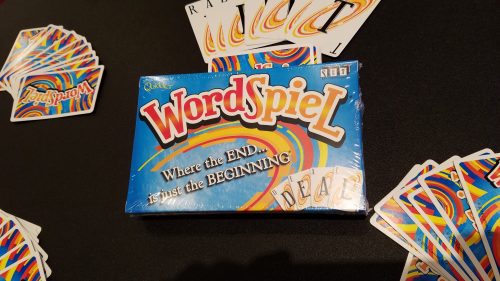
Here’s how it goes: we start with one letter card face-up. Each player gets ten letter cards and on their sixty-second turn, they play a word starting with the last letter(s) shown. So if the ever-growing spiral of cards reads STEP, the next player could play R, I, E, S, T for the word “priest”, and the lineup now looks like STEPRIEST. Then the next player could play R, A, N, D for the word “strand” using the ST at the end the spiral, and we’ve got STEPRIESTRAND.
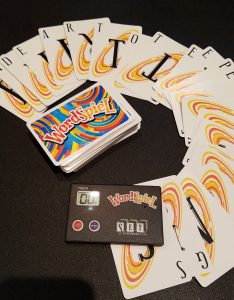 When it’s not your turn, you can discard up to three cards from your hand, drawing replacements. If the timer goes off — there’s a ten second warning beep — the player has to draw a card and either place it at the end of the spiral or add it to your hand. Get rid of your cards and you win, everyone else gets as many points as they have cards left in their hand.
When it’s not your turn, you can discard up to three cards from your hand, drawing replacements. If the timer goes off — there’s a ten second warning beep — the player has to draw a card and either place it at the end of the spiral or add it to your hand. Get rid of your cards and you win, everyone else gets as many points as they have cards left in their hand.
We played a three-player game and either were able to play cards right away or we realized we had nothing to play, also right away. We never went below forty seconds on the timer — even the ten year old didn’t — and we did have to adjust our hands a bit to find those elusive letter combinations to make something fit. But we never really needed the timer.
Overall a fun, quick game. The rules say the winner is the player with the lowest total score after five rounds, but three rounds was enough for us. I would recommend playing as many rounds as there are people playing.
WordSpiel was released in the past few days, so your store should have it now or shortly. It retails for $13.
Now, it’s my thought that a game deck featuring letters instead of numbers or pips needed something aside from just the rules one uses with the deck to make a game. For instance, there were four other new or re-issued games at Toy Fair we saw that used the same basics: a deck with letter cards. And there was also Quiddler at the same booth.
Playroom Entertainment’s Unspeakable Words also comes with little Cthulhu pawns. It’s one of many “make words with these letter” games, but this game has scoring based on the number of angles in the letter instead of rarity, and allows you to make up words with random letters if you go insane. A re-issue of the game in slightly different box is expected in May at a $25 retail price. Unspeakable Words has 96 letter cards.
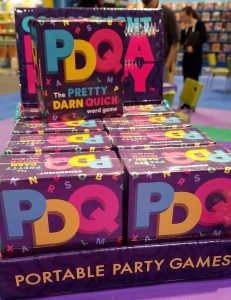 PDQ from Gamewright is another re-issue, having been out of print for five years. The game finds itself as part of the small box Port-A-Party line (all games in this line are $10 retail) as just a box of 78 letter cards. Throw three cards down and try to make a word out of them either left-to-right or right-to-left. The letters N K B come out. Did you shout out “unknowable” before someone else called out “broken”? Then you grab those three cards and keep them as points. PDQ will be available in March.
PDQ from Gamewright is another re-issue, having been out of print for five years. The game finds itself as part of the small box Port-A-Party line (all games in this line are $10 retail) as just a box of 78 letter cards. Throw three cards down and try to make a word out of them either left-to-right or right-to-left. The letters N K B come out. Did you shout out “unknowable” before someone else called out “broken”? Then you grab those three cards and keep them as points. PDQ will be available in March.
(We wound up playing PDQ with our WordSpiel deck. The girl took the deck to school for after-class game club on Monday and just wound up playing PDQ with it, over and over.)
Tactic Games USA is bringing out Word Rush in June for just $20. Draw one of the fifty topic cards and name a word in that topic that begins with one of the nine letter cards shown. (100 letter cards in Word Rush.) Flip a sand timer and put it on the letter used. Now the next player has to name something that fits the topic starting with one of the eight other letters before the sand timer runs out. If they do, they flip and move the sand timer. So there’s some strategy in how you use the time available in addition to just naming words.
- Word Rush
- Word Rush
- Wordsy
Or maybe you’d like Wordsy from Formal Ferret Games? That’s a reimplementation of Prolix by the same developer, but now uses 60 letter cards instead of chips. In Wordsy, you lay out eight letter cards in two rows, with each column of two cards assigned a point value from 2 to 5. Everyone searches for a single word that uses a lot of the letters shown; the first one to commit a word flips the sand timer, gaining a point to do so. And then, scoring. For the letters in the above photo, the word LEARNING would earn 19 points while the word GARBAGE would earn just 10. Wordsy will be out in June for $20.
You know, that looks like fun. We might give that a play with our WordSpiel deck.
A copy of WordSpiel was provided free for review by Set Enterprises.
- Comments Off on Decks and Decks of Cards with Letters

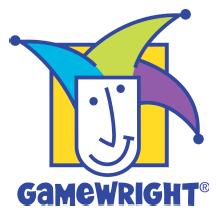 For 2013, Gamewright’s lineup includes nine new games, ranging from preschool to strategy titles.
For 2013, Gamewright’s lineup includes nine new games, ranging from preschool to strategy titles.
Skunk Bingo is for preschoolers and features a spinner, plastic log, bingo-style game boards, and tokens with pictures of various woodland creatures. The point, of course, is to fill one’s bingo board with matching creature tokens. The twist is that while the spinner indicates a number and type of token each turn, those tokens don’t go directly onto a player’s board. Rather, the player is supposed to slip them in to one end of the plastic log, which pushes a corresponding number of tokens—different ones—out the other end. These are the ones that go on the board. Also, skunks are useless. They don’t match anything.
Wig Out is actually a rerelease of an earlier Gamewright card game but with new packaging and cards for four additional characters. The game is played simultaneously, players throwing down their cards onto matching stacks. Stacks, though, can’t be started until one player puts down a pair. A player that has no matching cards is supposed to draw back up to a hand of eight. The winner is the first player to get rid of all their cards.
Chef Pop de Pop also involves a hand of eight cards. In this one, though, the goal is to save as many cards as possible by matching them to the results on popcorn dice in a shaker (the shaker looks kind of like a frying pan or a Jiffy Pop device from before everyone switched to the microwave). Also, one of the dice in the shaker is an action die meant to stir things up. For example, if the action die reads “Pop” then the first person to yell out “Pop” gets a free turn to themselves.
The goal when playing Monster Cafe is to feed as many monsters as possible their favorite meals, while not being stuck with any that are still hungry. It’s a set-collection game with a push-your-luck element. Players can grab monsters earlier, in the hope that they’ll be able to feed them later, or wait until they’ve been fed, with the risk that someone else will grab them first.
In Terzetto, two players go head-to-head, each turn trying to match with three same-colored marbles a pattern set with a shaker. The first person who can’t fit the pattern within their 5 x 5 grid, loses. The game can also be played with a variant, where the three placed marbles must be of different colors and the goal is to get three in a row of the same color.
Combining a marbles-like action game with a miniatures-style fantasy battle game is Cube Quest. In it, two players each get to recruit an army from among 25 cubes representing knights, priests, monsters, and other soldiers. Then, taking turns, they flick the cubes against the defensive structures each other has built, with the goal of knocking the opponent’s king out of his castle. A cube, though, that lands in an opponent’s area has the potential of being captured. Also, different types of cubes have different special abilities. For example, knights can be flicked twice on a turn.
That’s It! is a a trivia guessing game that is part of Gamewright’s Port-a-Party line. It comes with a set of cards, each listing five categories with specific examples. Each round, one player is supposed to read the categories, after which the other players attempt to guess the example. When a player guesses correctly, the reader yells, “That’s it” and hands the player a scoring token.
Iota, previously published by its designer, is a card game most easily described as a cross between Set and Qwirkle. Its cards are square and each has a unique combination of color, number, and symbol. Players are supposed to play the cards in a grid such that in any line either all cards have the same color, same number, and same symbol; or no two cards have the same color, same number, or same symbol; or the cards have the same color and same symbol, but are numbered sequentially.
And finally, there’s Forbidden Desert, a sequel to the company’s Forbidden Island. Like the previous game, Forbidden Desert is played cooperatively, with the players trying to collect artifacts—in this case, components to an ancient flying machine—while fighting the environment. Rather than rising water, however, this game features sand storms and shifting dunes. In fact, the tiles that represent the desert, not only slowly cover with sand markers, making it more difficult to excavate the artifacts, they also move around the board. And while running around the board, shoveling sand, and excavating (flipping desert tiles) the players’ characters are constantly dehydrating, making finding and managing water resources an important element of the game.
Forbidden Desert will be packaged in a tin a bit larger than Forbidden Island but still retail for only $25.
- Comments Off on Toy Fair 2013—Gamewright
Trending
- Massdrop.com
- Oh the Irony—Illuminati Card Game Continues to Inspire Conspiracy Theorists
- Footprints, an Educational Ecology Game
- USPS Adds Board Game Flat Rate Box
- Home
- Baila, the Estonian Drinking Card Game
- Crystal Caste Wins Dice Patent Suit Against Hasbro
- Mirror Game, Red and Blue
- Hasbro and Mattel Merger?
- Are Board Games Dangerous?
Archives
Most Popular Articles
- Oh the Irony—Illuminati Card Game Continues to Inspire Conspiracy Theorists
- The 20 Most Valuable Vintage Board Games
- The Truth About Dominoes On Sunday in Alabama
- Sequence Game, and Variants
- USPS Adds Board Game Flat Rate Box
- Baila, the Estonian Drinking Card Game
- The 13 Most Popular Dice Games
- Are Board Games Dangerous?
- Guess Who? The Naked Version
- What Happened to the Jewel Royale Chess Set?
Recent Posts
- Toy Fair 2019—Breaking Games
- Talisman Kingdom Hearts Edition
- Toy Fair 2019—Winning Moves
- Toy Fair 2019—Games Workshop
- Toy Fair 2019—Star Wars Lightsaber Academy
- Toy Fair 2019—Stranger Things Games
- Toy Fair 2019—HABA
- Licensing Roundup
- Game Bandit
- 2018 A Difficult Year For Hasbro But Not For D&D Or MtG
Recent Comments
- on Toy Fair 2019—Winning Moves
- on Game Bandit
- on Second Look—Dungeons & Dragons Waterdeep Dragon Heist
- on Crowdfunding Highlights
- on Beyblade SlingShock
- on Game Bandit
- on Game Bandit
- on Watch This Game!, the Board Game Review Board Game
- on Second Look—Vampire: The Masquerade 5th Edition
- on Palladium Books Loses Robotech IP License, Cancels Five-Year-Overdue Robotech RPG Tactics Kickstarter

